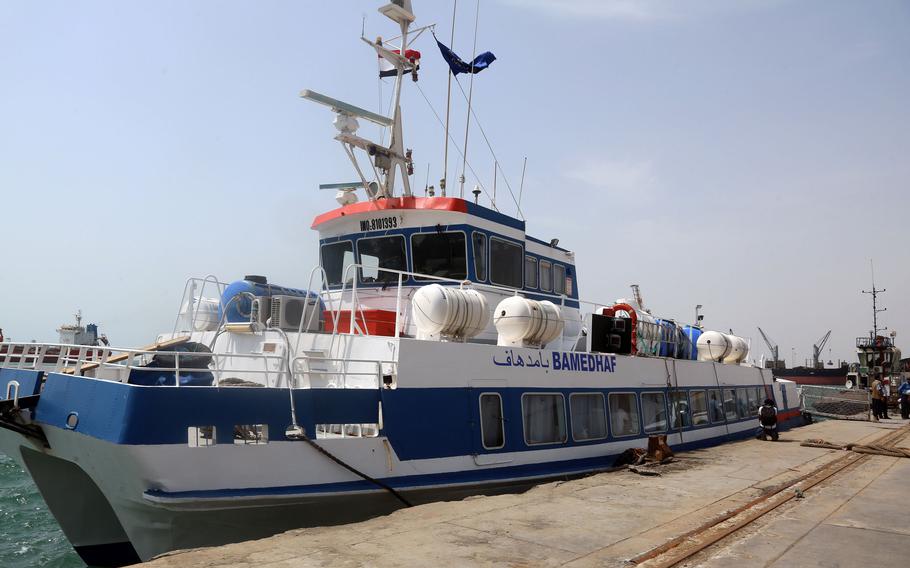
A picture taken on June 2, 2018, in Yemen’s rebel-held Red Sea port of Hodeida shows a ship flying the flags of Yemen and the International Organization for Migration moored to the dock as it awaits incoming Ethiopian migrants who are being repatriated via Djibouti. (Abdo Hyder, AFP via Getty Images/TNS)
(Tribune News Service) — Iran dispatched a warship to the Red Sea after the U.S. Navy destroyed three Houthi boats, a move that risks ratcheting up tensions and complicates Washington’s goal of securing a waterway that’s vital to global trade.
The Alborz destroyer traversed the Bab El-Mandeb strait, a narrow choke point between the Red Sea and the Gulf of Aden, on Monday, Iranian state media said without providing further information on the vessel’s mission.
Iran’s foray into the Red Sea a day after the U.S. action compounds a highly volatile situation in the channel that handles about 12% of the world’s commerce. The move could be seen as a challenge to the U.S.-led maritime task force established last month to halt attacks on ships by the Tehran-backed Houthi rebels who control a swath of Yemen’s northwest, including the capital Sanaa and the Red Sea port of Al-Hudaydah.
The Houthis, in November, began attacking vessels they claimed were headed to or owned by entities in Israel in a bid to end an Israeli offensive in Gaza, after Hamas, a U.S.-designated terrorist group, staged a shock attack inside Israel on Oct. 7.
In one month, the Houthis hijacked one container ship and launched more than 100 drone and ballistic missile attacks, targeting 10 merchant vessels involving more than 35 different nations, according to the Pentagon.
Operation Prosperity Guardian, involving the navies of the U.S. and nine other nations, swung into action from Dec. 19 and had a fierce encounter with the militants on Sunday.
Helicopters aboard two U.S. destroyers in the Red Sea, the USS Eisenhower and the USS Gravely, responded to a distress call by the Maersk Hangzhou as Houthis in four speedboats tried to board the vessel, according to the U.S. military. Houthi fighters ignored verbal warnings, fired at the aircraft and triggered a lethal response in which three of the boats were sunk.
It was the Houthis’ second major shipping attack in less than 24 hours and came after Denmark announced it was sending a frigate to the Red Sea to join the U.S.-led maritime coalition.
The U.S. has accused Iran of being “deeply involved” in the Houthi attacks in the Red Sea, which Tehran has denied, but said that it understood the reason for their actions. Iran hasn’t denied supporting the Houthis since the group ousted the internationally recognized government of Yemen in 2014.
A Houthi spokesperson, Yahya Saree, confirmed the incident and said 10 of the group’s fighters were dead or missing. He called on Yemenis, Arabs and Muslims to be “ready for all options in confronting the American escalation.”
Iran’s show of force in the Red Sea coincided with a visit to Tehran by Mohammed Abdulsalam, a Houthi movement spokesperson and chief negotiator. On Monday, he met with officials at Iran’s foreign ministry following talks with Ali Akbar Ahmadian, secretary of Iran’s Supreme National Security Council, according to Iran’s Nour News.
On Sunday Iran’s Foreign Minister Hossein Amirabdollahian denounced what he called double standards by the U.S. and some Western governments after a telephone conversation with the U.K. Foreign Secretary David Cameron, who urged Iran to rein in the Houthis. “Israel can’t be allowed to massacre women and children and carry out a genocide in Gaza and set fire to the region, but consider stopping an Israeli ship in the Red Sea as endangering the security of this economic waterway,” said Amirabdollahian.
Tehran’s moves are ultimately in the service of its own agenda of projecting power and driving Washington out of the region, says Joel Rayburn, a former U.S. diplomat and military officer.
“This is what the Iranian regime has always been intending to do with their outpost in Yemen,” said Rayburn. Iran thinks it can establish itself as “a great power sitting astride the region and its waterways.”
With assistance from Onur Ant.
©2024 Bloomberg L.P.
Visit bloomberg.com.
Distributed by Tribune Content Agency, LLC.